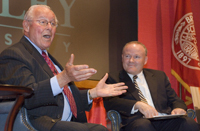
In April the Institute kicked off its program with two events. First, the Institute welcomed former U.S. House Minority Leader Bob Michel to a public forum on Bradley’s campus, an event which was covered by C-Span and Channel 47. At this forum, Michel shared the leadership principles that guided him during his 38 year distinguished congressional career.
It was very encouraging to see the lecture hall filled with Bradley students, who gave Michel, now 84 years young, a standing ovation both before and after the forum. Bob shared many great stories, including how he and President Reagan met with small groups of members of Congress at the White House to persuade them to support the administration’s tax policies and defense policies. Being in the minority party, Michel had to rely on the good relationships that he had formed across party lines to be effective in passing Reagan’s programs. As Michel recalled these legislative achievements, he became very engaged, waving his hands and sitting on the edge of his chair. It was great to see the students, who were also sitting on the edge of their seats, connect with Bob Michel in a very meaningful way. Bob Michel is the perfect role model for the Institute and is proof that public service can be a noble profession.
The next evening, on April 27th, the Institute held its inaugural banquet, packing the grand ballroom of the Hotel Pere Marquette. The theme of the evening was “A Legacy of Principled Leadership,” honoring the outstanding congressional leaders who have served the Peoria area. One highlight of the evening was when Frank Mackaman, of the Dirksen Congressional Center, paid tribute to U.S. Senate Minority Leader Everett Dirksen.
Mackaman first read from a letter that Dirksen wrote to his Democratic counterpart U.S. Senate Majority Leader Lyndon Johnson:
“Dear Lyndon…We have differed, but always with the highest respect for each other’s viewpoint. We have fought—gently, I hope, but always with understanding. We have asserted our various party causes, but always in good grace. We have shared a mutual pride in the Senate….And in the doing our friendship has deepened and become a nourishing force in pursuing our respective duties.”
Mackaman then read Johnson’s reply letter to Dirksen:
“Dear Everett…There are very few things that could have brought me more personal joy than that fine letter. It spoke, in such eloquent words, so many thoughts that are in my own heart…I have served with four Republican leaders. For all of them, I have developed a deep respect and rich affection. When I was a neophyte in the legislative processes, I was told that no leader can be useful unless he has friendships on the other side of the aisle. I have discovered that this is a statement of great wisdom.”
These excerpts reveal a genuine friendship and mutual respect between Dirksen and Johnson, leaders from opposite parties who understood that bipartisanship and collaboration were essential ingredients to effective governing. Indeed, it was just a few years after these letters were penned that President Lyndon Johnson would rely on Dirksen to secure the support of 25 Republican Senators to pass the landmark Civil Rights Act of 1964.
Another significant highlight of the banquet came when Congressman Ray LaHood paid tribute to his mentor and former boss Bob Michel. LaHood’s tribute entitled “The Michel Touch” was inspiring:
“Bob taught us by example that the House Floor should be forum for reasoned debate among colleagues equal in dignity. He inherited an old-fashioned work ethic from his beloved parents. So he came to the House every day to do the work of the people, and not to engage in ideological melodramas or political vendettas.”
Congressman LaHood went on to describe the “Michel Touch” as being “courageous enough to stand up for what you believe in, but humble enough to realize you are fallible….wise enough to understand that the other guy has a point of view worthy of respect.” LaHood concluded his remarks by thanking Bob Michel for being “a good man…a great, principled congressman….[and] a memorable, inspirational teacher.”
The Institute is grateful for the legacy of principled leadership that serves as a great foundation to launch our new program. Clearly, there is a need in our country and state to return to the kind of statesmanship and bipartisan leadership as modeled by both Dirksen and Michel. IBI

